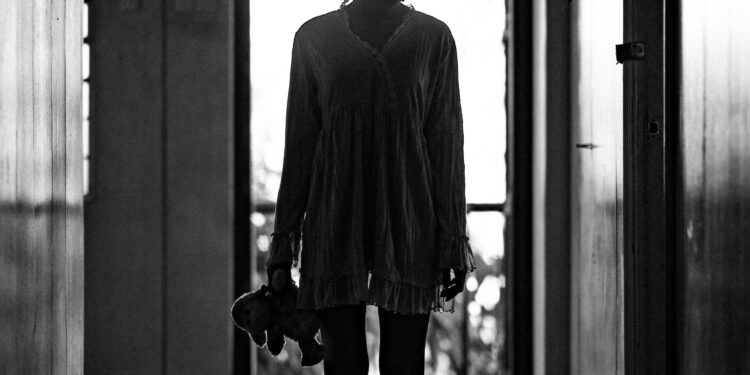Horror movies have an undeniable allure, captivating both youths and adults alike with their suspenseful plots and spine-chilling scenes. For many, these films offer a thrilling escape from the monotony of daily life. However, the mental, emotional, and psychological impacts of horror movies can be profound, affecting viewers of all ages in ways that extend far beyond the screen.

Mental Impact
Consider Alex, a 15-year-old who enjoys watching horror movies with his friends every Friday night. The excitement and adrenaline rush are exhilarating, but over time, Alex begins to notice changes. He becomes desensitized to the violence and terror, not just in movies but in real life too. Similarly, Jenna, a 34-year-old marketing executive, finds herself increasingly numb to news reports of real-world tragedies. The constant exposure to horror films like “Smile” (2022) and “Hereditary” (2018) has dulled their emotional responses, altering their perceptions of danger and suffering.
Both Alex and Jenna also experience sleep disturbances. The vivid and disturbing imagery from the movies haunts Alex’s dreams, leading to restless nights and constant fatigue. Jenna, already struggling with insomnia, finds it even harder to sleep after watching a particularly intense horror film such as “The Conjuring: The Devil Made Me Do It” (2021). The resulting lack of restful sleep affects their performance at school and work, making them more irritable and less productive.

Emotional Impact
Emma, a 17-year-old high school senior, loves the emotional intensity of horror movies. However, after watching “The Invisible Man” (2020), she becomes constantly on edge, her emotional state volatile. Tom, a 42-year-old construction worker, experiences similar anxiety after watching a movie about a violent home invasion like “The Strangers: Prey at Night” (2018). He starts to feel a lingering sense of unease, fearing for his family’s safety. The heightened anxiety and emotional volatility strain their relationships with family and friends.
Both Emma and Tom also notice increased aggression. The adrenaline and fear induced by horror movies make them more easily frustrated and quick to anger, especially in stressful situations. The emotional rollercoaster of these films translates into real-life emotional volatility, creating further challenges in their personal and professional lives.
Psychological Impact
Horror movies can trigger deep-seated fears and anxieties, affecting how individuals perceive their environments. Rachel, a 29-year-old teacher, used to love horror films until she watched “The Night House” (2021). The film’s eerie setting and supernatural occurrences leave her with a lingering sense of dread at her own workplace. Sam, a 14-year-old who bonds with his older brother over horror movies, experiences similar anxiety after watching “Annabelle Comes Home” (2019). For weeks, he has vivid nightmares and starts avoiding certain parts of his home.
Both Rachel and Sam’s experiences highlight how horror films can alter one’s perception of safety and reality. The psychological impact can be long-lasting, leading to avoidance behavior and heightened vigilance. These changes create a constant state of fear and stress, affecting their daily lives and interactions with others.

Escaping Reality
For many, horror movies serve as an escape from reality. The thrill and suspense provide a temporary diversion from everyday stressors. However, the stories of Alex, Jenna, Emma, Tom, Rachel, and Sam illustrate that this escape can come at a cost. The mental, emotional, and psychological effects of horror films can be significant, disrupting sleep, increasing anxiety, and altering perceptions of reality.
Balancing Entertainment and Well-being
While horror movies can be a captivating form of entertainment, it’s essential to balance their consumption with an awareness of their potential impacts. Parents and guardians can play a vital role by monitoring what horror films their children are watching and ensuring the content is age-appropriate. For adults, moderation is key. Limiting exposure to particularly intense or disturbing films can help prevent negative impacts on mental and emotional health.
Open discussions about the content and themes of horror movies can also be beneficial. Talking about the fear and anxiety these films evoke helps viewers process their emotions and distinguish between fiction and reality. Engaging in activities that promote relaxation and well-being, such as exercise, mindfulness, and hobbies, can counterbalance the stress induced by horror films.
Conclusion
Horror movies, while thrilling, can have significant mental, emotional, and psychological effects on both youths and adults. The shared experiences of Alex, Jenna, Emma, Tom, Rachel, and Sam highlight the need for a balanced approach to consuming these films. By being mindful of viewing habits and taking steps to manage the effects, individuals can enjoy the excitement of horror movies without compromising their well-being. Finding a balance between entertainment and mental health is essential for maintaining a healthy relationship with this captivating genre.

















